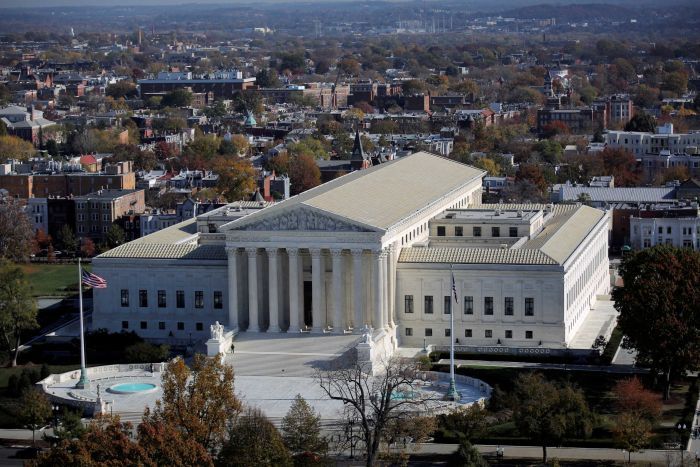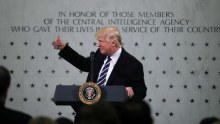Donald Trump's Supreme Court nomination: Why it matters and how it could change the US
Posted
 Photo:
Donald Trump said he would nominate a new Supreme Court justice "within two weeks" of being inaugurated. (Reuters: Carlos Barria)
Photo:
Donald Trump said he would nominate a new Supreme Court justice "within two weeks" of being inaugurated. (Reuters: Carlos Barria)
An early job for US President Donald Trump will be to nominate a new Supreme Court justice.
Key points:
- Mr Trump has promised to announce his Supreme Court nominee "within about two weeks" of taking office
- The political fight over a replacement for the late Antonin Scalia tipped to be the "first major battle"
- The Supreme Court plays "an outside role" on social issues in the US
There's been a vacancy since the death of staunch conservative Antonin Scalia almost a year ago.
His passing left the court with a 4-4 split of progressive and conservative attitudes for some cases.
This is the reason selecting a new Supreme Court justice is a fraught affair.
Broadly speaking, Republicans would like to see a conservative fill the vacant seat — while Democrats would prefer to see a progressive justice in the position.
And if you thought the battles between Republicans and Democrats over Mr Trump's cabinet nominations have been fierce, you haven't seen anything yet.
That's according to Professor Gordon Flake, the CEO of the Perth USAsia Centre at the University of Western Australia.
"For all the fireworks [we've] seen in hearings with the incoming secretary of education, or the secretary of state — those are minor compared to the fights over Supreme Court justices," he said.
And the reason for this, Professor Flake said, was due to the role of the court in making legal decisions on highly charged social issues.
"Social issues, particularly social issues that are at the intersection of religion and government and society, tend to be extremely important in America and they've been tools for politics in America for a long period of time, for both sides of politics," Professor Flake said.
"So issues like gay marriage, discrimination, school prayer — those issues are hot-button political issues that motivate political bases.
"Every one of those issues at the intersection between religion, government and society, the courts play an outside role.
"So the nomination of Supreme Court justices has taken on an outsized importance in American society because of the relationship between their decisions as final arbiter on a lot of these social issues."
Does that mean Trump will pick a conservative justice?
That's definitely expected.
And it's certainly the reason many people voted for the Republican, according to Professor Flake.
"The vast majority of the votes for Donald Trump came from your run-of-the-mill Republicans," he said.
"And so the question you have to ask yourself is: why would Republicans who claim to be conservative vote for a candidate like Donald Trump, who repudiates most conservative beliefs and stances, and has been all over the map on these core social issues?
"And one of the answers to that question is that the Republican base has been so frightened by the eight years of an Obama administration and the continuation of that, in terms of activist judges, in terms of appointments on the Supreme Court — that became a really effective way to get the mainstream of the Republican Party in line.
"It was a very effective way to get the rank-and-file to swallow their distaste for Trump and vote against Hillary [Clinton]."
During the election campaign Mr Trump was asked what he considered the most important aspect of selecting a Supreme Court replacement.
He singled out the second amendment, which guarantees the right to bear arms, as something he wanted protected.
Gun control is without a doubt one of those hot-button political issues.
"I am looking to appoint judges very much in the mould of Justice Scalia," Mr Trump said at the time.
"People that will respect the constitution of the United States. And, I think that this is so important, also the second amendment, which is totally under siege by people like Hillary Clinton.
"They will respect the second amendment and what it stands for, and what it represents."
Trump's nomination will still face scrutiny from the Senate
The President's pick won't automatically fill the vacant position.
The nominee has to be approved by the Senate's Judiciary Committee and then voted on by the entire Senate.
As the Republicans have a majority there, the nominee is expected to be endorsed.
"Really though, a lot is going to depend on who's nominated," Professor Flake said.
"If Donald Trump surprises and nominates somebody that is broadly acceptable to the Democrats, I think you'll see a surprising level of collaboration.
"But the names he's come out with so far are ones that have not led to a lot of confidence. I anticipate, given the importance of the issue, this will be the area where you see the first major battle.
"I think the legislature feels they've got an equal right to the President in making this determination and they'll approach it with that level of ferocity."
The age of Supreme Court justices is another factor
A replacement for Justice Scalia is the most immediate consideration.
During a press conference before his inauguration, Mr Trump said he was planning on making a decision "within about two weeks" of taking office.
But there could be several further vacancies in the next four (and potentially eight) years.
Two current justices are over 80. Another is 78. Two of those are progressive voices, while the other is considered a "swing" voter.
Professor Flake said age was certainly another factor that played into the politics of selecting Supreme Court justices.
"Because once they're appointed there's almost no way to get them out," he said.
"What Trump is likely to do is appoint people who are relatively young, who are going to set the course of the court for a generation to come, not just for a few years.
"Age is a highly sensitive and much-focused upon part of this appointment process.
"I don't think anybody has a good sense for the process through which Donald Trump is going to nominate future Supreme Court justices.
"If these last two months of the transition are any indication, it's going to be chaotic and unpredictable."
Topics: us-elections, government-and-politics, elections, world-politics, united-states









